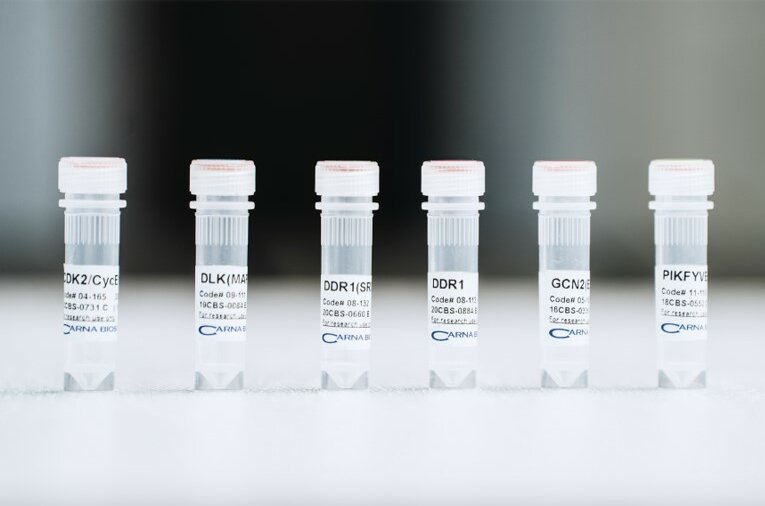Recombinant Protein Kinases
In collaboration with Carna Biosciences, we offer > 300 recombinant protein kinases produced in various forms. Benefit from the experience and know-how we have gained over 20 years.
Recombinant Protein Kinases
Kinases phosphorylate molecules that control complex cellular processes, such as growth, proliferation, differentiation, motility, and apoptosis. Under pathological conditions, kinase activity can be dysregulated, and disruption of the intracellular signaling networks controlled by these enzymes leads to many diseases, such as inflammation and cancer. As a result, kinase inhibitor drugs that block the action of pathologically dysregulated kinases have become an important target for drug discovery.
Recombinant protein kinases are produced using recombinant DNA technology, in which DNA sequences encoding the kinase of interest are cloned and expressed in a host cell, such as bacteria or mammalian cells. This allows for producing large amounts of pure protein kinase, which can then be used for various research applications, such as drug discovery and kinase activity assays.
Recombinant protein kinases are commonly used in drug discovery to screen small molecule compounds for their ability to inhibit or activate kinase activity, which is important for developing kinase-targeted therapies. They are also used in biochemical assays to study kinase signaling pathways and protein-protein interactions.
In cooperation with Carna Biosciences, we offer > 300 recombinant protein kinases produced in various forms, including full-length proteins or truncated forms containing only the catalytic domain. All products are developed and produced entirely in-house from gene cloning, expression, and purification and undergo rigorous quality control. Each kinase construct is carefully selected from the literature, and the DNA sequence is confirmed before expression.
Recombinant protein kinases can be engineered to include specific modifications, such as mutations or tags, which can alter their activity, and stability, or allow for easier purification. Various means are used to activate the kinases, like co-expression with an upstream kinase, ATP treatment, dephosphorylation, or tag removal. We will explain the different methods in more detail here.

Activation of Recombinant Protein Kinases
Pre-incubation with ATP
Many receptor-type tyrosine and other kinases expressed in cells are activated by agonist stimulation. However, isolating membrane proteins from our kinase expression systems is not easy. Instead, we express only the intracellular domain of the receptor tyrosine kinase, then incubate in the presence of ATP to promote autophosphorylation. This results in the kinase being fully phosphorylated and increasing its activity following purification.
Use of upstream kinases
To produce recombinant protein kinases involved in a phosphorylation cascade (a sequence of signaling pathway events where one enzyme is phosphorylated by upstream kinases, such as the MAPK cascade), we use an insect cell co-expression system with the kinase of interest plus upstream kinase. We then purify based on tag differences to yield an activated target kinase (see Figure 1). An alternative, simpler method involves incubating a purified target kinase with an upstream kinase in the presence of ATP, then re-purifying it to remove the upstream kinase, resulting in an active form of the kinase of interest (Fig. 2).
Protease cleavage of Expression Tag
Artificial manufacturing of recombinant protein kinases comes with a risk of inactivating the kinase activity. In general, Carna preferentially uses a GST tag to express kinases. Given that GST is a 26kDa protein that can dimerize, it’s difficult to say that this tag has no effect on the activity of the protein. As one solution, we incorporate a PreScission Protease (cytiva) cleavage site in our GST fusion kinases. Excising the GST tag from the protein can increase the activity of some kinases, as shown with our TSSK kinase below as an example (Fig. 3).
Dephosphorylation
GSK3 is an example of a kinase where phosphorylation of certain sites leads to lower rather than greater kinase activity. Specifically, it has been reported that Ser21 (GSK3a) or Ser9 (GSK3b) phosphorylation leads to the inactivation of the kinase. By implementing enzymatic treatment with phosphatase, GSK3 activity can be regained (Fig. 4).
We employ an approach optimized for each specific kinase, enabling us to consistently deliver enzymes of superior quality. The quality control includes confirmation of amino acid sequence by peptide mass fingerprinting, checking the purity by SDS-PAGE, determination of concentration using Bradford, and determination of activity using substrates from Carna’s extensive substrate library.
Why choose Carna`s Kinases?
Features of our recombinant protein kinases are no lag phase activity, GST-tagged or biotinylated (DYKDDDDK tagged) , available from 5 µg sizes up to bulk amounts, and batch-to-batch consistency. All products are developed and produced entirely in-house and undergo rigorous quality control, and are delivered to you with a lot specific data sheet. Take advantage of the lessons we learned and the expertise we gained over 20 years.
Select by Target Group
Select by Tag
Didn`t find what you were looking for?
We offer custom production services for any kinase of interest. Just contact us for more information.

